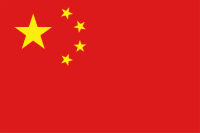Welcome to World Footy News Sunday, February 22 2026 @ 10:49 pm ACDT
 | China |  |
This page is a quick snapshot of the status of Australian Football in China. For further information, browse our news items or use the search facility. If you wish to contact football officials from the country, please search our site for links to their leagues or clubs, including in our Atlas. If unsuccessful, we can normally assist with putting people in touch.
Approx population (2009): 1.3 billion
National side: China Demons
Governing body: AFL China
Primary contact / link: Mic Mittasch – beijingfooty@yahoo.com
WFN Census (2004): 2 expat Aussie based clubs, approx 50 players (has increased dramatically since then)
WFN World Ranking (2008): 21st
History: Through the 1990s the main presence was expat Australian sides, most notably the Shanghai Tigers, Beijing Bombers and Hong Kong Dragons (and later Macau in the 2000s). With their assistance and through agreements such as a sister-city arrangement between Tianjin, the Melbourne FC, Melbourne City Council and the AFL, there was sudden growth amongst locals in the mid 2000s, including a school-based program for thousands of children in Suzhou (near Shanghai). China attended the 2008 International Cup (the first overseas tournament of the truly locals-only national side), scoring their official first ever win, defeating fellow newcomers India. 2009 saw two new clubs introduced, Guangzhou Scorpions & Macau Lightening
Outlook (2010): Very early in its footy development, but very promising with official party acceptance and programs sponsored by Melbourne FC, Melbourne City Council and the AFL, with good support from expat Australian sides. Several thousand junior players in Suzhou and university involvement which has provided the core of the national side. But the Melbourne FC and City Council arrangements have ended, so the game was potentially at a cross-roads at the start of 2010. The AFL exhibition match in October and Chinese match against Japan U21s suggests a commitment to the sport remains, and they intend participating in the 2011 International Cup.
Other points of interest: The ellipsoid shaped ball sports like Rugby translate as "olive ball", so Australian football can be translated as Australian olive ball.
Last Updated: Wednesday, December 01 2010 @ 01:13 pm ACDT| Hits: 5,885 


 RSS news
RSS news Twitter
Twitter Facebook
Facebook